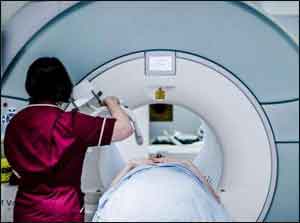- Home
- Editorial
- News
- Practice Guidelines
- Anesthesiology Guidelines
- Cancer Guidelines
- Cardiac Sciences Guidelines
- Critical Care Guidelines
- Dentistry Guidelines
- Dermatology Guidelines
- Diabetes and Endo Guidelines
- Diagnostics Guidelines
- ENT Guidelines
- Featured Practice Guidelines
- Gastroenterology Guidelines
- Geriatrics Guidelines
- Medicine Guidelines
- Nephrology Guidelines
- Neurosciences Guidelines
- Obs and Gynae Guidelines
- Ophthalmology Guidelines
- Orthopaedics Guidelines
- Paediatrics Guidelines
- Psychiatry Guidelines
- Pulmonology Guidelines
- Radiology Guidelines
- Surgery Guidelines
- Urology Guidelines
New type of MRI scan developed to predict stroke risk : JACC

Scientists have developed a new type of MRI scan that can accurately predict the risk of life- threatening strokes.
The non-invasive technique created by researchers at the University of Oxford in the UK produces a quantitative result that can accurately indicate whether plaques in the carotid arteries ? those that supply the brain with blood - are rich in cholesterol, and therefore more likely to cause a stroke.
The rupture of fatty plaques can block the arteries and cause potentially debilitating and life-threatening strokes as the brain is starved of oxygen.
If the plaque is deemed to be too big, people are treated surgically to remove it.
However, this method can miss fatty plaques that are not big, but have a high risk of rupturing.
The new magnetic resonance imaging (MRI) technique was developed to differentiate between the risky plaques that contain a lot of cholesterol, and those that are more stable.
In the study published in the journal JACC: Cardiovascular, the researchers used the new MRI scan to measure the amount of cholesterol in the carotid plaques of 26 patients scheduled for surgery.
After the plaques were surgically removed, the team looked at the actual cholesterol content in each plaque and found that the new technique was accurate and the more cholesterol they detected within the plaque, the greater the risk.
"When someone goes to hospital having suffered a minor stroke, it is vital that doctors know whether the patient might be at risk of a further stroke, which could be fatal," said Luca Biasiolli, from the University of Oxford.
"Being able to quantify cholesterol in carotid plaques is a really exciting prospect, as this new MRI technique could help doctors to identify patients at higher risk of stroke and make more informed decisions on their treatments," said Biasiolli.

Disclaimer: This site is primarily intended for healthcare professionals. Any content/information on this website does not replace the advice of medical and/or health professionals and should not be construed as medical/diagnostic advice/endorsement or prescription. Use of this site is subject to our terms of use, privacy policy, advertisement policy. © 2020 Minerva Medical Treatment Pvt Ltd